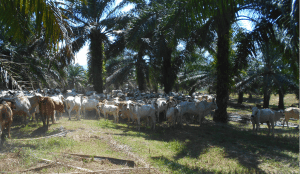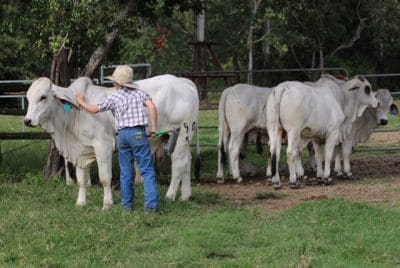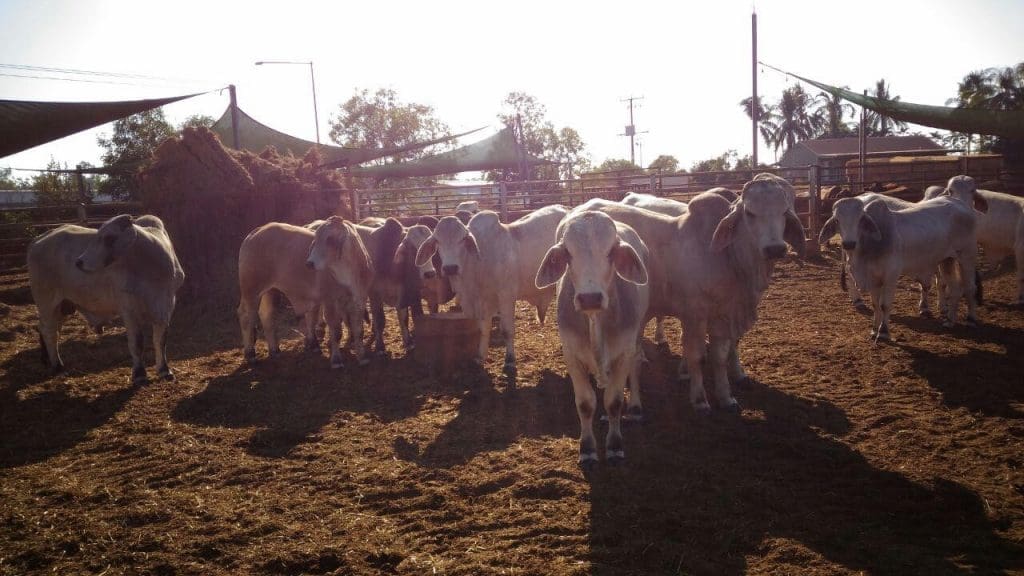
Breeders imported from Australia on the Ong plantation near Kuching in Sarawak. Picture: Dr Ross Ainsworth
Twenty young Brahman bulls bred at Mackay will soon be helping to drive genetic gain in a large cattle breeding herd run under palm trees on the island of Borneo.
The 12-16 month old Brahman bulls were shipped in June and are now acclimatising to their new home, a palm plantation and cattle property in Sarawak, Borneo, owned by Malaysian businessman Jeffrey Ong.
The bulls were sourced by Steve Ellison from Great Giant Livestock from Paul and Brigid Fenech’s PB Fenech Brahman Stud near Mackay earlier this year.
The sport of rugby connected Mr Ellison and Mr Ong many years ago when Mr Ellison was the state coach of the Johor rugby team in Southern Malaysia, and Mr Ong, recently returned from school in the United Kingdom, was one of Mr Ellison’s State rugby players.
They have remained good friends ever since and Mr Ong recently asked Mr Ellison to source some tropical bulls to improve the quality of his cattle herd at Sarawak.
The biggest challenge in in satisfying such a request was finding a cost-effective way to transport the animals.
In the past Mr Ong has had to fly-in breeding stock which adds significantly to the cost of genetic improvement.
Mr Ellison said he was fortunate to be talking at the same time to exporting company SEALS, which just happened to be preparing to ship a consignment of feeder cattle from Darwin to Sarawak for the Sarawak Government.
He was able to secure space on the same shipment for the 20 bulls, which significantly reduced the transport costs for Mr Ong.
The cattle were trucked from the PB Fenech Stud south of Mackay to Charters Towers where they were cleared through a dip. They were spelled twice on the route to Darwin’s Berrimah export yards, and then had a journey of eight days by sea to Sarawak.
They arrived in late June and will soon be introduced to a herd of 1500 breeders.
“They are top quality genetics out of the States, and they will give Jeffrey’s herd an enormous lift,” Mr Ellison said.
Breeder Paul Fenech said he had previously sold bulls and females to Brazil and has recently to Thailand, but this was his first export order to Malaysia.
He said the bulls would have sold through his annual on-property bull sale in October had the export order not arisen.
The export order was well worth pursuing, he said, indicating the same 20 bulls would have had to have made at least $7500 each at the on-property sale to have offset the value of the order.
“They are all by our own homebred sires and have been naturally raised on tropical pastures, so I think they will suit the plantation there,” he said.
In a recent article for Beef Central, South East Asian correspondent Ross Ainsworth explained that Malaysia has millions of hectares of palm oil plantations but has been prevented from profitable integrated cattle production due to cheap live imports from Thailand and even cheaper frozen Indian buffalo beef.
However, now that world prices are climbing steeply, planters are giving cattle breeding a serious rethink providing another potential future market for Australian breeders.
Dr Ainsworth recently visited Mr Ong’s Sarawak plantation, which is pictured above right.
He said Mr Ong is employing a simple but effective strategy of selling all male production once a year for the Qurban religious festival, which makes for simplified marketing and achieves the highest price every year.
Cattle are typically rotationally grazed under the palm trees.


